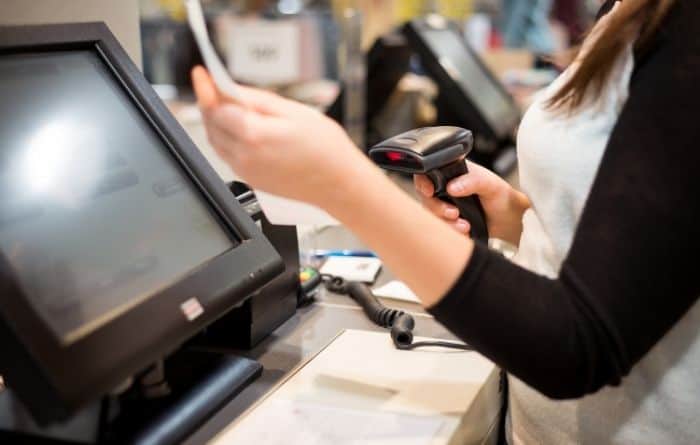Key Features of a POS System: What to Consider Before Buying?
 Point-of-sales System (POS) is the spot where business transactions like sales, orders, and rentals take place. The key features of a POS system include inventory management, sales management, employee management, and pricing and service customization. POS systems consist of hardware components like barcode scanners, computer screens, printers, and card payment processors. Likewise, software systems can be installed on the special hardware or accessed from any device if it is cloud-hosted.
Point-of-sales System (POS) is the spot where business transactions like sales, orders, and rentals take place. The key features of a POS system include inventory management, sales management, employee management, and pricing and service customization. POS systems consist of hardware components like barcode scanners, computer screens, printers, and card payment processors. Likewise, software systems can be installed on the special hardware or accessed from any device if it is cloud-hosted.
Key Features of a POS System
The following are the most common features of every POS system. Make sure that the system of your choice contains all of them:
Invoice Management
Invoice Management is one of the most common features of a POS system. Any POS system must be able to record, store, and present every transaction that occurs in the business. In the case of sales, the system is able to update the stock of the product in real-time. Likewise, if there is a transfer of stock from one store to another, there must be deduction and addition in the respective stores. Furthermore, if somebody rents a product from your store, it must be able to track the period of renting and impose additional charges when the predefined period exceeds.
Inventory Management
One of the most exciting features of a POS system is its extraordinary inventory management. The system allows you to track and inspect your inventory in real-time. Likewise, with automated updates, it can instantly show the rise and fall in the stock of different products. Moreover, it can also track the transfer of stock between multiple stores. Advanced features include automatic ordering of frequently bought items when the stock drops below a predefined threshold.
Customer Management
For any business, customer satisfaction should be one of the topmost priorities. Since there are several stores and e-commerce options to choose from, retention can be hard without proper customer care. A POS system must be able to store customer information and keep track of their purchases. If they are frequent buyers, make sure you keep sufficient stock every time. Furthermore, this will also allow you to track their orders for non-available items and alert them about availability. Proper customer management will help you design loyalty programs and promotional offers.
Supplier Communication and Management
To maintain a consistent stock of products, you must be able to inform your suppliers early on. The POS system can alert your suppliers about decreasing stock and ask for a refill. In this way, you can prepare your stock levels in case of emergencies and shopping seasons. Furthermore, consistent communication is important to maintain a good relationship with your suppliers.
Employee Management
It is likely that you are going to have several employees to handle checkouts and sales. Thus, it is important that you track the performance of each employee. A POS system will record the information about the employee’s working hours and his performance. This will allow you to improve underperforming employees through feedback and reward the outstanding ones.
Reports and Charts Generation
POS systems can instantly produce reports and charts that you can analyze to develop future plans and strategies. If you have multiple departments and stores, you can generate specific reports to make a comparative analysis.
Key Considerations While Choosing a POS System
Before choosing a POS system, it is important that you assess its flexibility, ease of use, options of payments, and associated hidden fees.
- Make sure that the software and hardware interfaces are easy to use. This will decrease the training time for your employees.
- Look for the types of payments that it can accept. A wide range of acceptance methods means you can serve a wide range of customers. Most importantly, make sure it complies with advanced security and fraud protection laws.
- For cloud-based services, look for the additional costs that come with scaling and integration of additional features.
- Assess the flexibility and integration support. A flexible POS software can run on several POS hardware systems.
- Lastly, make sure that the costs of acquiring the system are worth it.
How Can We Help?
From this blog, we have learned what a point-of-sale system is, what are its major components, and how it helps manage your business operations.
3E Accounting is a highly-reputed Singapore digital advisory company with decades of experience and affordable services. Our digital advisory specialists have unmatched expertise in this field and hence can suggest the best POS options according to your business needs.
All the details of our top-notch digital advisory services are available.
Contact us at +65 66909262 or email at [email protected] for more information.









